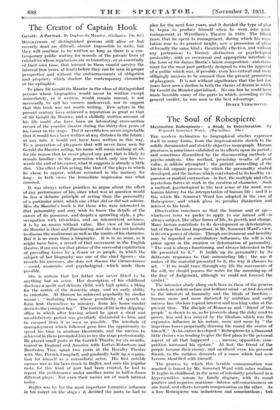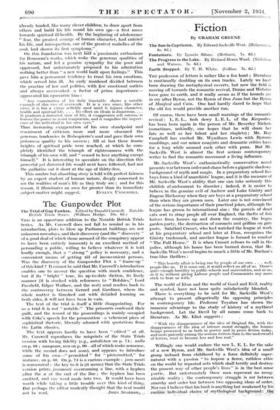The Soul of Robespierre
Maximilien Robespierre a Study in Deterioration. By Reginald Somerset Ward. (Macmillan. 188.)
THE modern inclination to biographical studies expresses itself in many forms, from the impressionistic sketch to the solidly documented and strictly objective monograph. Human greatness is sometimes exhibited in its effects upon its period ; and sometimes discredited by the disconcerting methods of psycho-analysis. One method, promising results of great value, is seldom attempted : the patient unravelling of the bit-by-bit organic process by which the personality studied developed, and the factors which contributed to its healthy ex- pansion or morbid contraction—in fact, the multiple and often mysterious forces at work in the creation of character. Such a method, psychological in the best sense of the word, uses human history for the interpretation of human life : and it is this which Mr. Somerset Ward has adopted in the case of Robespierre, and which gives its peculiar distinction and interest to his book.
Observation convinces us that the human soul or ego— whichever term we prefer to apply to our inmost self—is always subject, like other forms of life, to growth and change. Many factors contribute to its development or deterioration, but of these the most important, in Mr. Somerset Ward's view, is its own power of choice. Though environment and heredity may be regarded as contributory influences, the will is the prime agent in the Creation or deformation of personality. " The soul is always functioning, and always interested in the life presented to it." It builds up its personality by its deliberate responses to that surrounding life ; the use it makes of the material presented to it, the way it chooses to act. " If we could trace through any life the movements of the will, we should possess the notes for the summing-up of the Day of Judgement, although we could not forecast the verdict."
The intensive study along such lines as these of the process by which an ardent nature and brilliant mind—at first devoted to the interests of humanity and the ideals of 'freedom— became more and more distorted by ambition and early success has obvious topical interest and teaching value at the present time. The disciple of Rousseau, and " friend of the people " is shown to us, as he proceeds along the risky road to power, less and less swayed by the idealism which was the expansive influence in his nature, more and more by " the imperious forces perpetually drawing life round the centre of himself." As his career developed " Robespierre by a thousand little choices was tending to give the first place to the personal aspect of all that happened . . . success, opposition, com- petition increase& his egoism." At last, the friend of the people became their enemy, and sacrificed even his personal friends to the ruthless demands of a cause which had now become identified with himself.
The process by which this terrible consummation was reached is traced by Mr. Somerset Ward with sober realism. It begins in childhood, in the sense of inferiority produced in a hypersensitive nature by family disgrace, with its usual positive and negative reactions—intense self-consciousness on one hand, and efforts towards compensation on the other. As a boy Robespierre was industrious and conscientious ; but
already tended, like many clever children, to draw apart from others and build his life round his own ego—a first move towards spiritual ill-health. By the beginning of adolescence
fear, the greatest scourge of kuinan character, had entered" his life, and introspection, one of the greatest maladies of the
soul, had shown its first symptoms." --
On this foundation was nc±t laid a4passionate enthusiasm for Rousseau's works, which woke the generous qualities of his nature, and fed a genuine sympathy for the poor and oppressed, but unfortunately proposed to his admiration nothing better than " a new world built Upon feelings." This gave him a permanent tendency to trust his Own emotions,
which served him ill. An early ManhOod divided between the practice of law and politics, with few emotional outlets and always overworked---u factor of prime importance— aggravated his egocentric bias :
"Any examination of his daily timetable shows a notable example of this vice of overwork. It is a vice -since, like other vices, it is but a virtue selfishly used until it injures character, health and spiritual life. . . . Its effect on ideals is disastrous... . It produces a distorted view of life, it exaggerates self esteem,'it lessens the power to resist temptation, and it magnifies the import- ance of the individual in his own eyes."
Thus increasing exaggeration of his own standpoint and resentment of criticism more and more obscured the generous tendencies in Itobespierre's soul and gave their own poisonous quality to his success ; till at last those insane heights of spiritual pride were reached, at which he com- pletely identified the triumph of righteousness with the triumph of his own will, and " ceased to love anything except himself." It is interesting to speculate on the direction this powerful yet distorted life would next have followed, had not the guillotine cut it short at the age of thirty-five. - This sombre but absorbing story is told with perfect fairness by an expert student of human nature, deeply concerned to see the realities of man's life as they truly are ; and for this reason, it illuminates an area far greater than its immediate















































 Previous page
Previous page